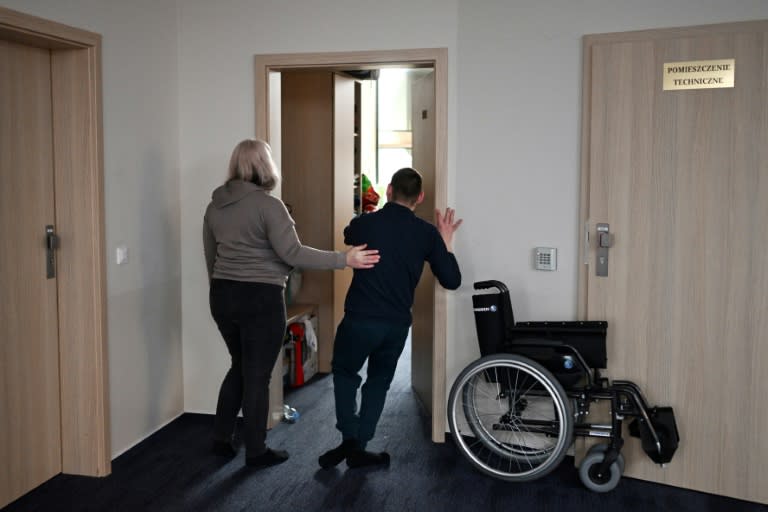News Flash
News Flash

WARSAW, Feb 24, 2025 (BSS/AFP) - For Olena Koshulko, the first year after fleeing Ukraine was a blur -- and now the fear is creeping in again as her new home Poland mulls curbing benefits for Ukrainians like her.
To escape Russia's invasion of her country, she moved to Poland to live in a shelter near Warsaw with her two children: Veronika, 12, and Oleksandr, 18, who was born with disabilities and needs round-the-clock care.
The 43-year-old stay-at-home mother now faces losing her monthly benefit of 800 zlotys ($200), which all parents -- including Ukrainians -- can claim for each child under the age of 18.
Poland's authorities have floated the idea of limiting the payment to Ukrainians who work in the EU country.
"I can't work because my son's condition requires constant care," Koshulko told AFP as she tended to Oleksandr, whose gait disorder confines him to a wheelchair on longer distances.
Koshulko could only afford to buy the wheelchair thanks to funds raised by a charity and state support.
"If I stop receiving the payment, I don't know how we'll survive," she said.
Poland, Ukraine's neighbour, has been an ally of Kyiv as it struggles to fend off the Russian invasion launched in 2022.
Warsaw has vocally advocated ramping up military aid for Ukraine, as well as bringing it closer to NATO and the European Union.
But as the war enters its fourth year, Poland has also indicated it would scale back the aid it provides to some of its 900,000 Ukrainian refugees.
With a presidential election coming up in May, Poland's ruling centrists face an electoral threat from the far right which has sought to capitalise on growing anti-Ukrainian sentiment.
Prime Minister Donald Tusk's close ally and presidential frontrunner Rafal Trzaskowski last month said the child benefits should be restricted to Ukrainians who "work, live, and pay taxes in Poland."
- 'Can't work' -
According to a recent opinion poll by the Ibris Institute, 88 percent of Poles back the move.
That includes Tusk, who pledged his government would "urgently" examine the proposal, and his arch-foes from the biggest opposition party, the Law and Justice (PiS).
The social affairs ministry estimates that around 80 percent of Ukrainians in Poland are either working or actively seeking a job in the EU country of 38 million people.
But for some, like Natalia Kapustina, going back to work is simply not feasible.
"I had a very good job in Ukraine," Kapustina, a pastry chef and baker by profession, told AFP.
The war changed everything for the 46-year-old -- her village, Tavrychanka, in Ukraine's southern Kherson region, has been occupied by Russian forces.
Kapustina lived under the occupation for 10 months but, as her husband serves in the Ukrainian army, staying became too dangerous.
She fled to safety in Poland with her son Kostya -- leaving behind her family who had helped her take care of the 8-year-old who struggles with chronic leg pain.
"When his condition gets worse -- it can be due to a change in the weather or something else -- his legs hurt a lot, and he can't go to school," Kapustina said.
"The pain usually starts at night. He can be in this condition for a week. And I can't work."
- Poland 'benefiting' -
It is refugees like Kapustina who will be affected the most, argues Myroslava Keryk, a prominent activist and head of "Our Choice" -- the largest Ukrainian nonprofit operating in Poland.
"Those who are not working, these are carers. These are people with disabilities, or parents of children with disabilities," she told AFP.
Hers was one of almost 50 humanitarian organisations that sent a joint appeal to Tusk urging him to abandon plans to curb benefits for Ukrainian refugees.
In the letter, the nonprofits warn against "the tendency to use the topic of Ukrainian refugees for political purposes".
The Polish government has already slashed other benefits designed to help Ukrainians, such as financial compensation for those who hosted refugees and a one-time payment for refugees starting a new life in Poland.
But Keryk pointed to a study commissioned by the UN refugee agency and released last year by Deloitte, estimating that Ukrainian refugees in 2023 contributed up to 1.1 percent to Poland's GDP.
To her the conclusion is clear: "The Polish treasury is currently benefiting from the fact that Ukrainian refugees are here."
"They rent apartments, buy food, and live here, so everything goes to the state budget or to Poles who run businesses here," she added.